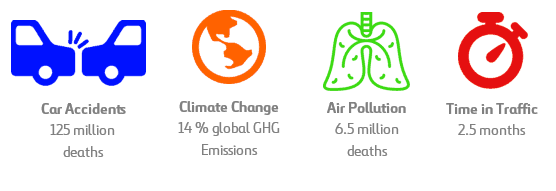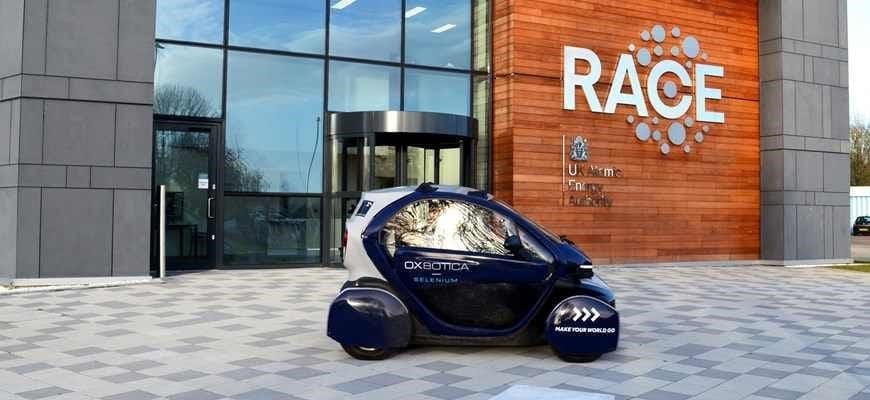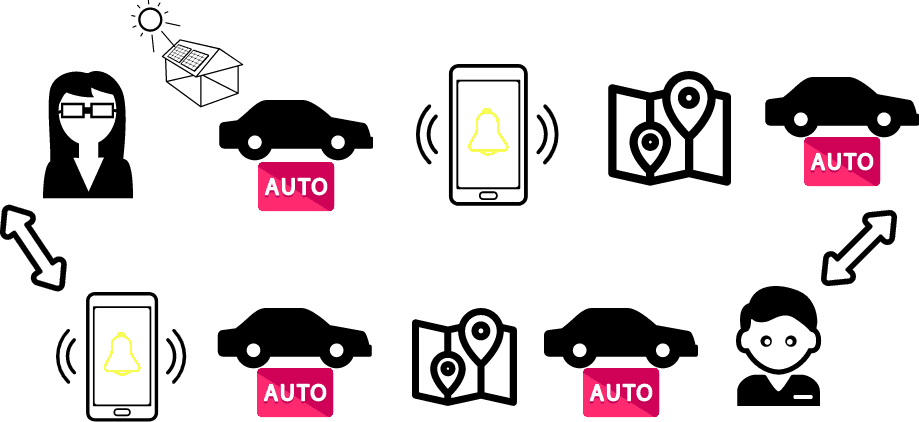
People’s ability to move from place to place has changed dramatically in recent history. Not long ago travelling to a neighboring village would take half a day. Now people can travel from London to Paris in one hour, London to Madrid in under 2 hours and London to Sydney in a day! Trade in goods has exploded, with the likes of Amazon enabling customers to buy anything and have it delivered to their door within a matter of weeks, days and even hours. This has had an extremely positive impact for humanity- we can move more freely from country to country, eat food from around the world stabilising food markets and be part of a global community.
The transport industry owes its success largely to the discovery of oil and the invention of the internal combustion engine in 1859, which has led to 95% of vehicles on the planet today running on oil (Petrol and Diesel). But, there is a problem with oil – the price we pay for it does not reflect the actual cost of using it (its true cost). Atmospheric pollution, climate change, health impacts are some of the additional costs of using oil, not factored into the price you or I pay at the pump. If oil companies picked up the tab in any of these areas, take for example health problems caused by vehicle pollution, there would probably be a hike in the price we pay at the pump. If they accounted for all of them (as they probably should), they may not be in business very long – and there may be an increase in demand for electric vehicles, with beneficial consequences for the global community.
There is also something more fundamental which is not accounted for in an oil based transport system – it is a finite resource. There is only a certain amount of the stuff for us to use and there has never been more removed from the Earth than now – around 96million barrels are extracted each day currently. It took millions of years to accumulate but we are happy to use it in ever increasing quantities. To use a financial analogy, we are drawing down on the principle and not living on the interest! In other words, we are using oil faster than it can be replenished, and we are buying at prices which do not even cover the cost of the damage it is doing to human health and the rest of the planet.
Challenges to the Status Quo
The transportation industry contributes to roughly 14% of the global Green House Gas emissions at around 7 Gigatonnes equivalent (Gte). This is accelerating global climate change and the warming of our planet, the consequences of which are severe. Added to this, the combustion of oil-derived fuels in combustion engines (95% of all vehicles) produce harmful fumes which damage people’s health. Globally each year around 6.5 million people die from disease related to poor air quality. What’s more, these vehicles do not provide a particularly safe form of travel – around 125 million people die in road traffic accidents a year. You are ten times more likely to die in a car accident than in a plane accident. And over 30 hours are lost in traffic jams per individual per year! That is around 1,800 hours over your driving lifetime, or 75 days, or 2.5 months, spent in your car crawling bumper to bumper.

It is fair to say these are significant challenges, which are negatively impacting large numbers of people today – but with every big challenge comes a big opportunity. Thankfully, the global community is beginning to realise this and with new technology, are doing something about it.
The future is here: Autonomous Vehicles (AV), Artificial Intelligence (AI) and Data
Amey are partnering with companies in a consortium (RACE, Siemens, Oxbotica and Westbourne) which aims to understand to understand the challenges related to autonomous vehicles, specifically their interaction with people. The project will run a trail at Culham Science Centre in Oxford in which autonomous vehicles and people are monitored, to understand the interactions which could be expected once autonomous vehicles are on public roads at large.

Global statistics for transport industry challenges
Preliminary results from public & academic perception surveys indicate a willingness by both groups to support autonomous vehicles on both environmental and safety grounds. But, how would you feel seeing a car with a driver in the front seat not paying attention to the road? Or even worse, asleep at the wheel?! I think I can answer that one for you. This is the gap in knowledge and perception which the project is hoping to understand further, because if you can understand people’s concerns about a new technology you can do something to ease them and make transition as easy as possible.
Combining autonomous vehicles and artificial intelligence, Amey are leading a project called Artificial Intelligence Street Sweeper (AISS). The project is in its early stages and will trial a slow-moving fully autonomous street sweeper which will use artificial intelligence (AI) to learn from its environment. The trial will aim to observe the effectiveness of the vehicle in cleaning streets, the safety of the vehicle and the public perceptions of the vehicle.
Connected Autonomous Sensing Service Delivery Vehicle (CASS-DV) is a project Amey are currently running which is using a vehicle mounted with sensors to determine how data gathered from the sensors could be used to manage highway infrastructure. In a future where all vehicles are autonomous and therefore “sensorised”, there will be a constant collection of data from the road network by all vehicles using it. How this data will be managed and used will be a great opportunity for companies like Amey and Ferrovial to improve the industry and services to the end users.
Bringing it all together – Mobility as a Service
Mobility as a Service (MaaS) is the integration of various forms of transport services into a single mobility service accessible on demand. Thorough a MAAS lens, vehicles are viewed as mechanisms to provide transport for people, even if they do not own a vehicle themselves, and provide an income for people who own vehicles. Cars will no longer be assets used solely by individuals, but as a shared fleet of vehicles in society which generates income for owners and provides transport for users at a fee. When cars become fully automated the potential of MAAS becomes exciting. This concept of MAAS can be quite abstract if you haven’t heard it before, so hopefully the scenario below makes it more tangible…

“Sarah drives to work in the morning and parks her car in the car park. She walks to her desk, and by the time she sits down and looks at her phone there is a notification from Sam asking to borrow her car. The platform Sarah and Sam use facilitates the exchange of transportation as a service, backed by insurers and the local authority. Sarah accepts Sam’s request which automatically sends Sam’s GPS coordinates to her car. She hits enter and sets the car to auto drive to location, and off the car goes! Sam uses the car for the day and returns it for the agreed time at the end of Sarah’s work day, apart from he doesn’t have to return it, the car returns itself…”
This is the potential of MAAS – how exciting is that! At the moment, Amey and Ferrovial are part of the Centre for Connected and Autonomous Vehicles (CCAV), a joint policy unit between Business, Energy and Industrial Strategy and Department for Transport (UK Government), addressing the interaction among vehicles, infrastructure, and data to achieve these technologies’ significant economic and social benefits.
MAAS, AV, AI and the electrification of the transportation network will change the current methods of business across the industries we operate in. It is for this reason we are committed to understanding the impact change is going to have on our customers, mitigating risk and maximizing benefits. It is an exciting time to be a part of Ferrovial and Amey, and we look forward to what the next ten years have in store.





There are no comments yet